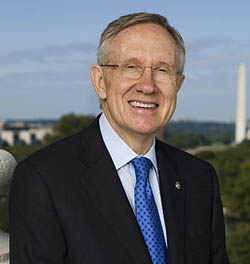Senator Harry Reid, the Democratic Senate Minority Leader, told the press last week that 2015 will be the year when the U.S. Congress seriously discusses a ban on online gambling. Last minute efforts failed to attach Restore America’s Wireless Act to the spending omnibus in the lame duck session of Congress.
To hear Harry Reid speak, 2015 is expected to be pivotal for the online gaming industry. It could see a comprehensive 50-state ban on online gambling or it could see unfettered online gaming from the perspective of the federal government.
Getting Rid of the Wire Act
Reid told the Las Vegas Review-Journal, “I think there will be efforts made to look at the Wire Act in a Republican-initiated Congress, yes I do. I think there will be efforts made to get rid of the Wire Act.”
Senator Reid went on to predict that the debate would be thorough. Though he did not mention them by name, he was likely referring to the libertarian wing of the Republican Party, who will be against more federal gaming laws.
Harry Reid Wants Online Poker
Harry Reid said his own preference is to ban online casinos, while allowing online poker, which is less troublesome than slot machines. Reid said, “I think the proliferation of gambling on the Internet is not good for our country. I think it is an invitation to crime. I think it is hard to control for crime when you’ve got brick-and-mortar places, let alone something up in the sky someplace, and it is very bad for children. If there is a chance to [legalize] poker, I will do that, but I am not for the Wire Act.”
The Wire Act was passed in 1961 to ban sports betting over telephone lines. The law was used in the 1960s to prosecute organized crimes. Over the decades, it was used to put many mobsters and independent bookies in jail. The law involved sports betting, so the Wire Act was used in conjunction with the 2006 Unlawful Internet Gambling Enforcement Act to make online sports books illegal. The UIGEA made it illegal for online payment processing services to support transactions involved in illegal Internet gambling.
Interpretations of Federal Law
Since 2006, opponents and proponents of online gambling have debated which activities are illegal under the UIGEA. Unlike what is often reported, the UIGEA does not make any form of gambling illegal. In those debates, the Wire Act has been cited as the law banning gambling activities. Some regulators and lawmakers have argued that online casinos and poker rooms should be banned under provisions of the UIGEA and the Wire Act.
That was the interpretation used by the U.S. Justice Department from late-2006 until late-2011. In late-2011, the states of Illinois and New York asked the DoJ whether online casinos and poker sites were considered illegal under the Wire Act violations clauses. The Justice Department said that was not the interpretation–that only sports gambling was illegal under the Wire Act.
Online Casinos and Poker Sites
The ruling opened the door for individual states to legalize and license online poker and casino websites. Nevada, New Jersey, and Delaware have done so, to one extent or another. States like Pennsylvania, Massachusetts, and California have discussed legalizing online gambling sites. Meanwhile, a backlash has happened.
Sheldon Adelson, president of the Las Vegas Sands Corporation, became a vocal critic of the Department of Justice’s ruling. He vowed to spend as much money as needed to see a 50-state ban on online gambling, citing problem gambling. People laughed at Adelson for being either quixotic or self-serving, but his stance has gained attention by lawmakers.
Restore America’s Wire Act
In April 2014, US Rep. Jason Chaffetz (R-Utah) and US Sen. Lindsey Graham (R-South Carolina) announced their support of Restore America’s Wire Act. The two Republican congressmen wanted to counter the Justice Department’s ruling and add online casinos and poker sites to the list of banned sites under the Wire Act. In 2014, passage of the RAWA was given a 1% to 7% chance by Washington DC watch groups, but that was before the Republicans seized control of the U.S. Senate.
Now that the GOP controls both houses of Congress, it’s far more likely to see a bill go before President Obama that includes anti-online gambling provisions. Under those circumstances, Obama might want to sign the law into existence and be relatively indifferent to the gaming provisions. If so, he might sign the bill into law for higher political reasons.
Libertarian GOP Members Against RAWA
The Republican establishment is hardly in agreement on Restore America’s Wire Act, though. Grover Norquist, arguably the most powerful lobbyist in Washington D.C. these past two decades, came out recently in opposition to the RAWA. He believes such a law is a vast expansion of federal authority, essentially nullifying states rights. Though it involves only the federal government’s ability to impose gaming laws on a 50-state basis, it could set a precedent for many manifestations of government power at the national level.
Therefore, the chances of the law passing are still remote. In fact, if Harry Reid is right, Sheldon Adelson’s activism might cause a backlash in which the libertarian wing of the GOP fights the social conservatives and win. In that circumstance, the Wire Act itself could be struck down.

